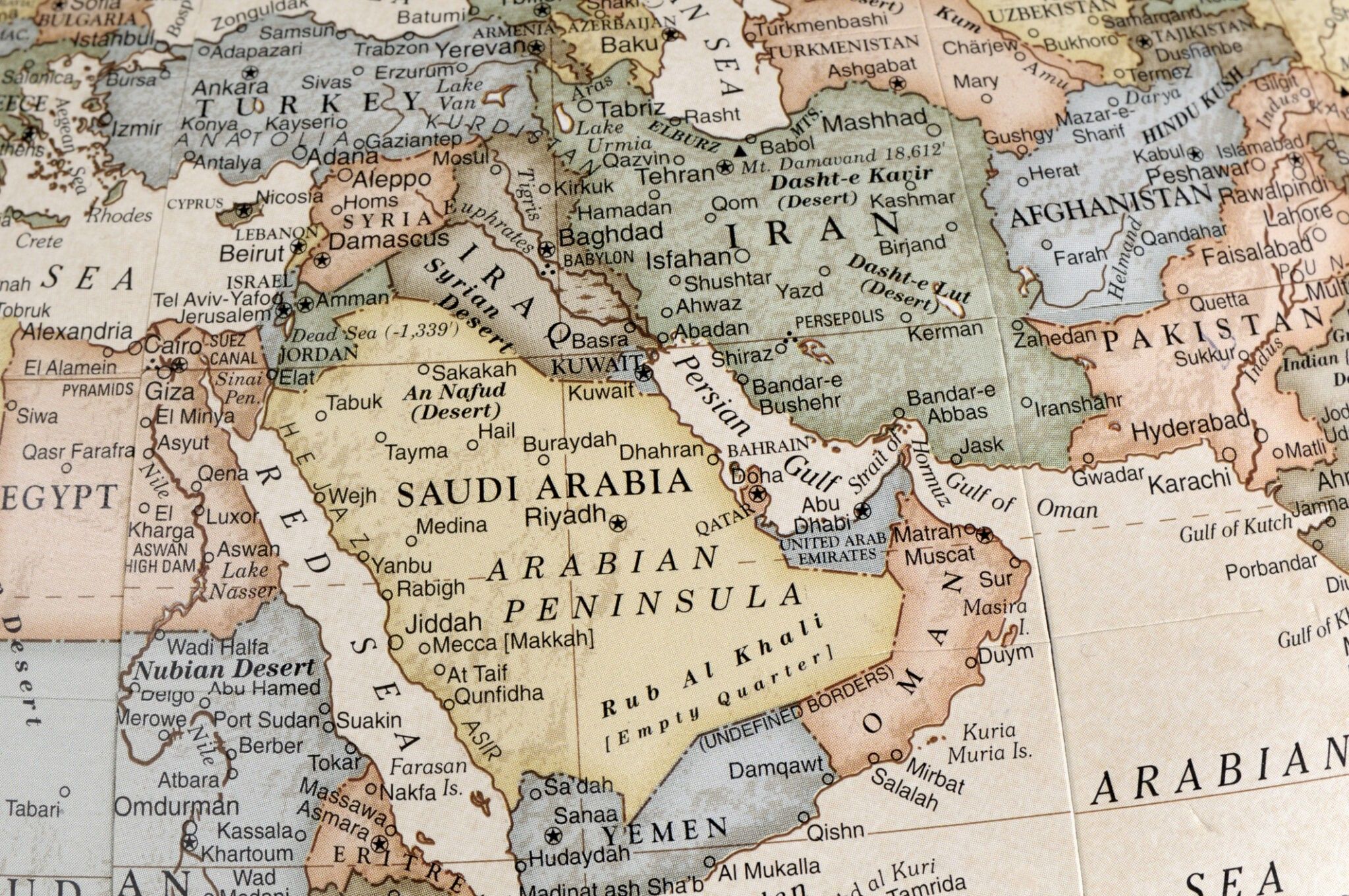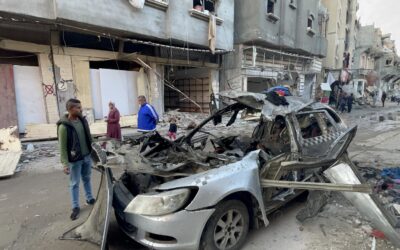
Israel Strikes Iran
BOTTOM LINE UP FRONT – Less than one week after Iran’s attack against Israel, Israel struck Iran early on Friday, hitting a military air base […] More

The dynamics of the Middle East are changing. From a protracted pandemic to a rise in Chinese interest and influence in the region and a general fatigue in the West of long military conflicts, the region today poses both threats and opportunities that are far different than they were even a couple of years ago.
The Cipher Brief talked with Expert Norm Roule, who served as Former National Intelligence Manager for Iran at the Office of the Director of National Intelligence (ODNI) – and now travels routinely to the region for meetings with high-level officials in multiple countries – to get his take on how he sees the region changing, the dynamics behind it, the new U.S. role and where issues and events are most likely heading.
The Cipher Brief: Let’s start with the big picture. What is the single most important framing issue we should consider as we look at the Middle East?
Roule: Perhaps the most transformative issue shaping the region and world in general is the emergence of an increasingly multipolar dynamic not seen since the late 1930s or 1870s. For some, this will mean a chance to assert new influence regionally and positive transformation of their politics and economies. The Abraham Accords, Emirati interfaith and technological initiatives, and Saudi social and economic liberalization are all part of this process. India’s rise has only begun but we should consider more of what this means for the Middle East.
U.S. influence is shifting in this new world. Events are beginning to play out with less attention to U.S. views. Iran, Russia, Turkey, and China have all sought a larger regional footprint, sometimes using asymmetric tools. Status quo states internally debate response options while these aggressive, yet innovative actors build facts on the ground.
The drivers behind this evolution are complicated and include the rise of China and India, Brexit, Western fatigue with long military conflicts, and the unopposed hybrid warfare conducted by Iran, Russia, and Turkey. A weak United Nations, splits within Europe, a sometimes-rudderless NATO, and a proliferation of informal alliances over traditional international organizations all serve as variables we should consider. The economic, social, and political implications of COVID continue to complicate this. It’s clear that it would be an overstatement to attribute this evolving dynamic solely to U.S. decisions or even that we are leaving the region. Certainly, Americans have shifted their views on our role in the world and how we should treat long-time adversaries and partners. But our private sector engagement is robust and growing.
There is a growing concern over what role the U.S. will seek in the Middle East. Whatever your views on the Afghanistan withdrawal, the catastrophic consequences for the Afghan people have rolled out on the doorstep of an already turbulent region. The poor execution of our departure collapsed an international security effort, redefined the political geography of southwest Asia, deeply damaged America’s credibility in the region, and sharpened political divides within the United States. All of our regional partners have watched this with concern.
The Cipher Brief: You talk about Russia, China, Iran, and even Turkey as revisionist actors. These are very different countries. Do they share any common strategies or tactics?
Roule: I think there are several common threads here. As their name suggests, revisionist actors seek to change the status quo. They often initially employ attributable but deniable tactics to test adversary fortitude. Such states tend to gravitate towards each other, especially when they seek leverage against the U.S. and Europe.
They also share several goals:
• First and foremost, revisionist states seek to transform the fabric of the international community in a way that normalizes actions previously considered unacceptable and even a basis for war. Such countries are risk tolerant, but war is not their aim. Their strategy requires a world which has convinced itself that it is unable or unwilling to pay the potential price of confrontation with aggressors. This leaves non-coercive diplomacy or economic sanctions as the only tools left to policymakers.
· Aggressive revisionist countries are often the target of sanctions. However, because they are authoritarian, they can endure economic punishment relatively well in the short and middle term.
· Revisionist countries don’t avoid diplomacy; they exploit it. Diplomacy offers a means to bring their priorities to the forefront of the world’s stage. Absent its aggressive behavior, Iran would certainly not receive the international attention it has enjoyed in recent years. Because adversaries respond to threats based on their proximity to danger, revisionists use diplomacy to fracture coalitions. Consider here how Europe and the Arab Gulf States or Israel respond to Iran. Another example is the different positions held by Europe and the United States regarding China.
· Second, they seek to reassert influence in geography they view as historically theirs to control.
· Last, they look to eradicate U.S. influence or at least severely weaken that influence. For all our challenges, the U.S. remains the best and perhaps only guarantor of global stability.
The Cipher Brief hosts private briefings with the world’s most experienced national and global security experts. Become a member today.
The Cipher Brief: Let’s shift the focus to Iran. What are Tehran’s goals in the nuclear talks?
Roule: First, some context. Whereas the nuclear issue dominates U.S. thinking on Iran, Iran’s policy regarding the West is broader. Tehran also considers how its choices will impact the transition of the regime to a new generation of hardliner leadership. Iran does not seek engagement with the U.S., nor does it show any interest in modifying its behavior on regional or missile issues.
The arrival of the Biden administration in January 2021 brought a series of attractive policy shifts far beyond an announced intention to return to the nuclear deal. Almost every key member of the Biden team dealing with Iran was well known to Tehran as a supporter of the nuclear deal. A number of the new administration’s senior and mid-level officials had publicly opposed the maximum pressure tactics of the Trump years and spoke out against military action against Iran. The administration’s relations with Israel and the Gulf Arab states would likely be frosty. Washington made it clear that it planned to draw down its military presence in the Middle East. It is unlikely that even Iranian leaders expected an American withdrawal from Afghanistan, but that decision certainly reinforced any assessment that the U.S. commitment to the region was flagging. The administration’s focus on improving relations with Europe, competing with China, and resolving complicated U.S. social and infrastructure issues would severely limit the domestic and foreign political capital left to deal with Iran.
Iran could have chosen a quick return to the deal. But Tehran wanted more. Iran’s goals in the talks have been consistent, although they sharpened with the arrival of Iran’s new hardline president.
First, Tehran has sought to become the dominant voice in the direction, timing, and participants included in nuclear talks. U.S. tensions with Russia and China helped in this regard.
Second, Iran used the nuclear talks as a buffer against pressure over its regional, missile, terrorist, and hostage-taking actions as well as to gain de jure recognition of its leadership. Nuclear talks compel the most important international players to overlook Iran’s non-nuclear activities and engage Iran in a forum that treats Tehran as a major power. The Raisi government is one the bloodiest regimes in the history of the Islamic Republic, yet its representatives routinely meet Western counterparts.
Third, expand its civilian nuclear program to achieve a new normal that the international community would be forced to accept, to achieve permanent nuclear weapon threshold status, and a bargaining lever against demands to extend the deal’s sunset clauses.
Next, minimize the impact of nuclear and non-nuclear sanctions. Iran’s Supreme Leader has repeatedly opposed commercial engagement that also brings the contagion of Western liberalism. This doesn’t mean that Tehran opposes commerce. Indeed, the opposite. Iran desperately seeks foreign investment and Western technology. But even if nuclear sanctions are lifted, Tehran’s non-nuclear aggression routinely bring sanctions of their own. Few business leaders are willing to risk shareholder assets in a geography so likely to become the target of economic pressure. For this reason, Tehran has sought to use the talks to prevent the U.S. from being able to impose significant sanctions for any reason in the future.
Last, Tehran seeks to weaken U.S. influence within the Middle East and on the international stage. Iran is unlikely to return to a deal until it believes it has done everything possible to ensure that another U.S. withdrawal – or imposition of oil or financial sanctions in response to Tehran’s non-nuclear aggression – is off the table.
The Cipher Brief: It sounds like a deal is off the table.
Roule: It is hard to imagine the restoration of the 2015 Iran nuclear agreement without substantial and consequential concessions by the United States. The Biden administration will find it difficult to release non-nuclear sanctions given Iran’s well-documented violations of international law.
On a side note, I do believe we could see a hostage deal this year. In return for Westerners unfairly imprisoned in Iran, Tehran would gain the release of Iranian nationals and likely billions of dollars of frozen funds. Such a step will be lauded by hostage families and some advocates of engagement, but it is unlikely to stop Tehran from seizing hostages in the future.
Go beyond the headlines with expert perspectives on today’s news with The Cipher Brief’s Daily Open-Source Podcast. Listen here or wherever you listen to podcasts.
The Cipher Brief: What would make Iran change its mind for a deal? Are there any indicators we should watch?
Roule: I don’t see much evidence that Iran feels it must make major concessions. Tehran follows our politics closely and they undoubtedly understand the political challenges facing the Biden administration, to include the ongoing crisis with Moscow.
In theory, though, several things might shift the dynamic. These include: P5+1 belief that Iran is preparing to weaponize its civilian nuclear program. A major economic or political crisis in Iran might cause Tehran to seek the political and economic benefits of a return to the deal. I don’t see either of these scenarios as likely. If a deal does occur, it will more likely be the result of deep U.S. concessions, particularly on how we would impose future sanctions.
Read more expert-driven national security perspective and analysis in The Cipher Brief
Related Articles

BOTTOM LINE UP FRONT – Less than one week after Iran’s attack against Israel, Israel struck Iran early on Friday, hitting a military air base […] More

SUBSCRIBER+EXCLUSIVE INTERVIEW — With a mere 1.2 million citizens, Estonia is among NATO’s smallest members, but its contributions to Ukraine have led the pack by […] More

SUBSCRIBER+ EXCLUSIVE ANALYSIS — Iran’s retaliatory strikes against Israel this weekend were both a potentially game-changing, historic first — and an underwhelming response. Historic, because […] More

SUBSCRIBER+EXCLUSIVE INTERVIEW — Ukraine was hit by a fresh round of Russian missile attacks on Thursday, strikes that targeted and damaged the country’s power grid […] More

SUBSCRIBER+ EXCLUSIVE REPORTING — The Israeli drone strike that killed three adult sons (who Israel says were Hamas operatives) and four grandchildren of Hamas’s Qatar-based […] More

BOTTOM LINE UP FRONT – In the spring of 2022, Ukraine beat back a Russian assault on the nation’s capital and punished the invaders on […] More
Search